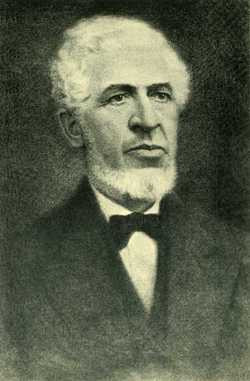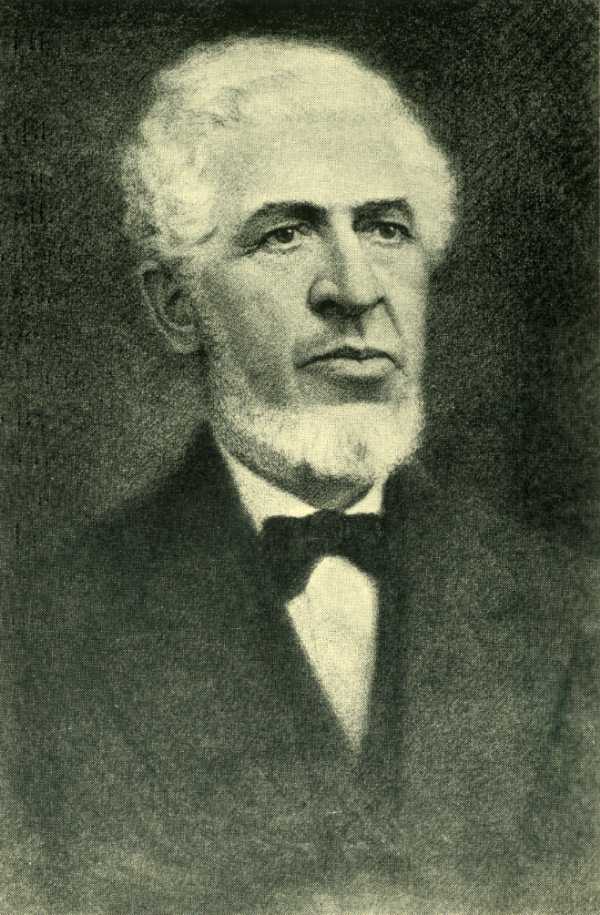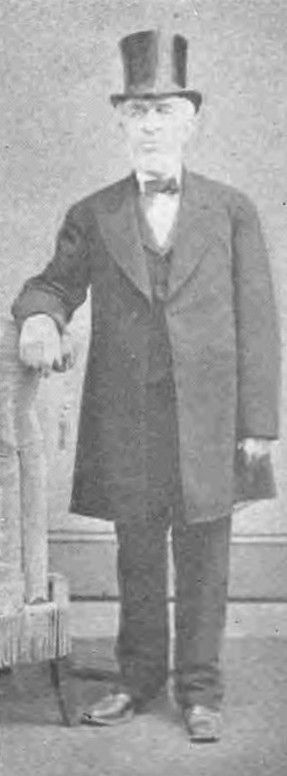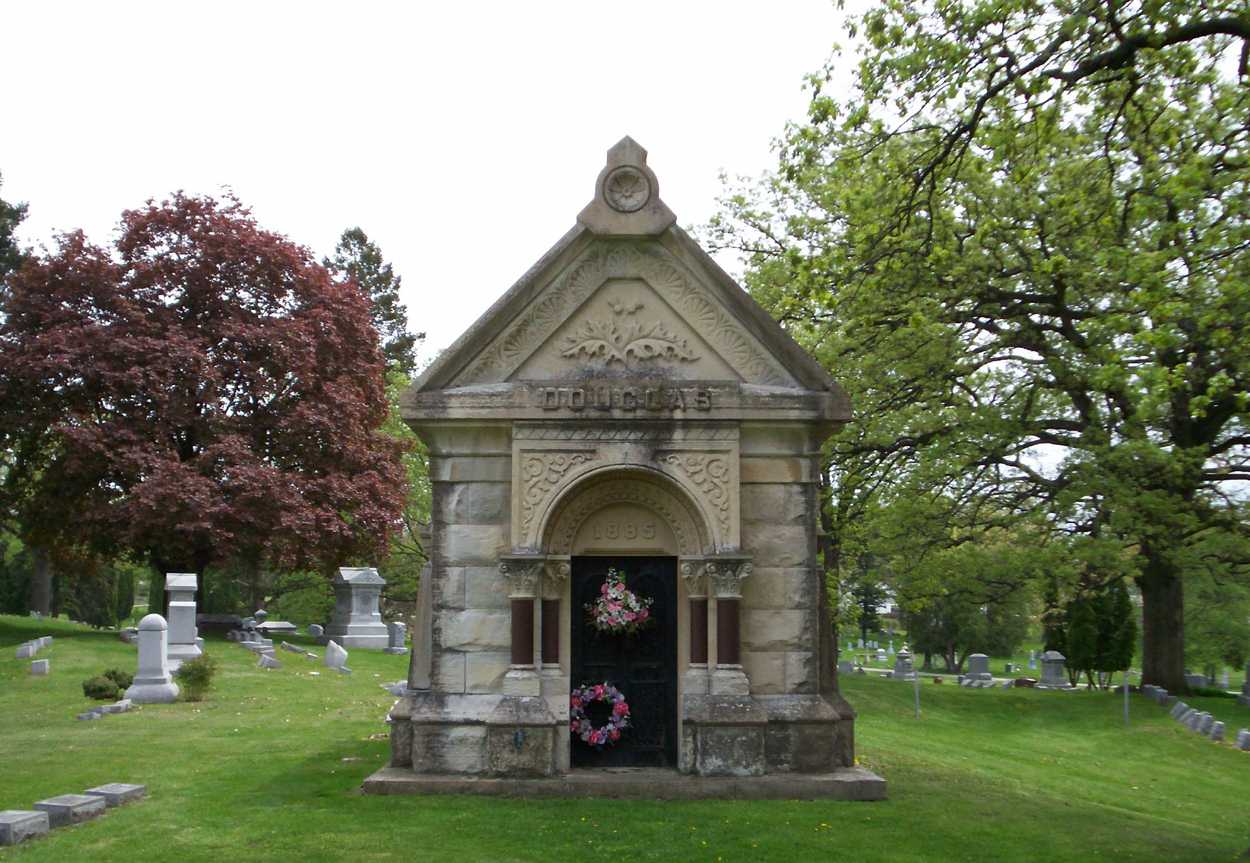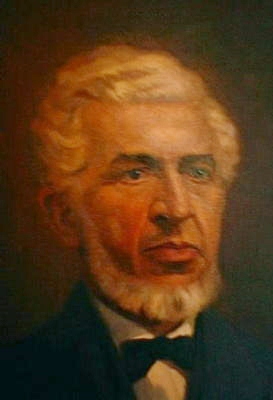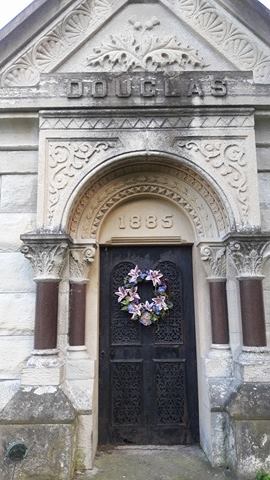Geo. Douglas, Sr., Summoned To His Everlasting Rest at 11:40 To-day.
Another of the Grand Developers of Cedar Rapids Stricken by Death in the Days of His Usefulness.
Particulars of Mr. Douglas; Death Together With a Short Sketch of His Life.
The Sad News.
__Shortly before twelve to-day the report that Uncle George Douglas was dead was heard upon the streets, and the crape upon the door of the late residence indicated, alas, that the report was true.
__It was not surprising to those who had known of his illness for several months, occassioned by a heart difficulty and which was the cause of his death, but it nevertheless caused one and all to bow their heads, and in many an eye the tears made known their presence. Mr. Douglas took a trip to Florida last winter where he remained during the months of February and March in the hope of receiving some benefits from the warmer climate down there, but he found no relief and returned home seven weeks ago to-day. Eveything was done for him that medical aid and the most constant nursing and tender care could do, but he grew rapidly worse and it was known several weeks ago that his days were numbered. Dr. Ross, of Chicago, one of the most eminent physicians in that city, was called and he stated last Friday that his time was short. It was Dr. Ross who suggested that as Mr. Douglas desired to see his son, Walter married before he died, that the ceremony should be performed before many days, and as Walter and Miss Camp were married last evening, the father had his hope fulfilled of witnessing the ceremony.
A Noble Man.
__A nobler heart then that of Uncle George Douglas never beat in Cedar Rapids. A man who had fewer faults never lived here. A man with a kinder disposition, more genial in his nature, more honorable in his business dealings, more generous, or more just, never placed foot on Iowa soil. If he had an enemy in the world, we never heard of it. We have never heard him speak an unkind word either to or of anybody, and of him there can be said nothing but good.
__Mr. Douglas was one of the most prominent business men not only of Cedar Rapids but of the west. He has been here for nearly fifteen years, and established the oat meal mill in 1874 - the largest in the world, since that time having built mills in Oregon and Chicago, Ill. He has been identified with the development of the city ever since coming here, and the good he has done for Cedar Rapids can never be estimated. Fire and explosions have several times destroyed his mills here, and yet despite all these misfortunes he has lost no time in building up again. He was vice-president of the Cedar Rapids Water Company; vice-president and director of the Cemetery Company; the leading partner in several large oat meal mills; was one of the founders of Gates, Gifford & Douglas' shoe factory; was identified with both the Merchants' National bank and the Eagle Woolen Mills, and in fact there were few if any public enterprises inaugurated during the years that Mr. Douglas has ever resided here, that he has not in some way lent a helping hand. He was always looked upon as one of those sound solid, substantial reliable Scotchmen, whose word was as good as his bond, and who, when he said anything meant it. There was no warmer or truer friend than Geo. Douglas. He was always the same, genial, kind-hearted gentleman, with a pleasent word for one and all. But thus the sainted fathers go. One by one the early pillars of Cedar Rapids are dropping out. Each year marks the demise of one or more of those grand developers of the great interests of Cedar Rapids, and to the names of Judge Greene, T. M. Sinclair, R. D. Stephens, father Gainor, Porter W. Earl and others we might mention, must now be added that of one of the noblest, Uncle Geo. Douglas.
__By his death Cedar Rapids sustains another irreparable loss, and that will be felt for years to come. His advice and wise counsel will be greatly missed, and in the various avenues of life where he has been commingling with his friends and neighbors his loss will be keenly felt. For ten years the writer has passed the home of Uncle Geo. Douglas nearly half a dozen times a day, and as year after after year made whiter the honored hairs of his head, our respect grew greater with each succeeding year. He was indeed a grand, good man, and it seems impossible that he has gone from earth forever, but alas, he has, and we can only remember him with pleasure, respect and gratitude. The following brief sketch of his active and eventful life will be of interest:
__Mr. Douglas was born in the county of Caithness, Scotland, April 17, 1817. He Came to Rochester, New York, in 1848, and until 1852 was engaged in the constuction of railroads, and canals and in the year of '52 he came west and located in Chicago, where he took a contract for the stone and mason work for the Illinois Central Railroad at Dixon. He continued there until '55 when he took a contract on the Dubuque & Pacific which he completed in one year. In January 1857 he took a contact for bridging and grading the Dubuque & Sioux City road at and near Waterloo, Iowa. In 1858 he went to Austin, Minn., and took a contract for grading and masonry work of a portion of what was known as the Cedar Valley & Indianapolis road. In 1859 he contracted for work on the Western Union railway in Illinois. In 1860 he had a contract on the Webster county court house at Ft. Dodge. In 1861 graded and did the masonry work on some of the Cedar Rapids & Missouri river road. In 1862 he helped build the road from Cedar Rapids to Marion, and from Marshalltown to State Center, grading, ironing, etc.; in 1864 and '65 he had a similar contract on the Nevada & Des Moines road, and in 1866 he did the grading and masonry work from the Des Moines river to the Missouri river a distance of 153 miles. He did the same work on 103 miles of the Sioux City & Pacific road in 1867-68, and built fifty miles from Iowa Falls to Ft. Dodge in 1869-70. In the latter year he went to Texas, where he built 155 miles of the International railway, building the road, laying the rails, putting up depots, etc., along the entire road. After finishing that contract he came to Cedar Rapids, where he was in no active business until 1874, when he established the oat meal mill.
__Up to the time of going to press the arrangements for the funeral have not been completed, but the funeral will probably take place Thursday. We will announce the day and hour to-morrow.
----
The Cedar Rapids Evening Gazette, Fri., May 23, 1884, p. 1, col. 4 & 5.
At Rest.
Funeral Services of the Late George
Douglas This Forenoon.
A Grand and Fitting Discourse by Rev. Mr. Baird of Mt. Vernon.
The Obsequies.
__The funeral services of the late George Douglas took place at 10 o'clock this forenoon. A large delegation from the Board of Trade, joined by business men generally, proceeded to his late residence on First avenue, and there took carriages in the procession to the First Presbyterian church. The casket was placed between the two doors of the auditorium, and the lid was removed so that the face of the deceased could be seen by all the people as they passed in. The pall bearers were Messrs. S. L. Dows, Jno W. Henderson, J. C. Brocksmit, W. W. Smith, C. B. Soutter, W. W. Higley, Wm Buchanan, and W. S. Cooper.
__Messrs. F. C. Olmstead and Chas. I. Jones were the ushers.
__Mr. W. W. Walker had general management of the services.
__The floral offerings were profuse, rich and beautiful. An elegant "Gates Ajar" was sent by the Manson family of Waterloo.
__"The Wreath and Sickle," a very handsome offering was from the Brown family of Dubuque. Messrs. T. M. Sinclair & Co. presented a rich floral offering, a sickle.
__A beautiful pillow of roses came from a Dear Friend.
__From Mr. Chas. B. Soutter an offering of cut roses.
__By Mrs. Wm Greene a basket of beautiful cut flowers.
__From Mrs. A. and Elmer Higley a basket of Jack Roses and Easter lilies.
__A broken column from Mrs. N. M. Hubbard, composed of carnations and Easter lillies over which was a rich wreath of Jack roses.
__The church was filled to its capacity, notwithstanding the fact that there were frequent showers during the forenoon.
__The choir sang that pathetic hymn, "Earth has no sorrow which Heaven cannot heal," after which Rev. Stephen Phelps gave a short Bible reading and offered a fervent prayer, when the choir rendered another hymn.
__The funeral sermon was then preached by Rev. Mr. Baird, of Mt. Vernon, a near and dear friend of Mr. Douglas.
__We can only give a brief synopsis of the sermon, owing to the lateness of the hour at which our stenographer completed transcribing his notes.
__Mr. Baird spoke of their long acquaintance and of the many happy hours they had spent together. Mr. Douglas was a sound theologian, and was the best judge of a sermon that he knew. In speaking of him he did not want to say anything but the truth, for "I say what I do in the presence of God and George Douglas, and if he could speak he would say, "make me no gilded character, for I want to be spoken of as the world knew me," but I do think that through Christ he is at rest. I well remember how we oftimes sat for hours together, and the things that he and I talked of are fresh and clear in my mind. He was a good many years my senior, but we had been companions and warm friends for a long time, and told him I wanted to meet him a thousand years from now in Heaven. Often we talked of the great responsibility resting upon the christian, and says he, it is a tremendous thing to stand before the world as a model for all to look upon and to publicly acknowledge yourself as a follower of Christ by approaching the communion table and taking in one's hands the emblems of the broken body and blood of Christ.' 'I am not worthy,' said he. I said, 'Friend Douglas, what are going to do about it? you are not very old, yet you are old enough to die, and you will very soon be so old that you must die.' His voice trembled with tenderness and he simply said, 'I am a poor, sinful man, my hope is in the blood and the mercy and the atonement of my Savior.' He loved the church of Christ through his life, gave his time and his money to the support of the gospel. He loved to associate with Christian people, and many of them were his warmest friends. There were few better judges of a sermon than he. It must have thought in it and it must have Christ in it. He was a severe as well as a clear critic, and the minister who tried to put on airs he handled without gloves. He loved all his ministers. He loved his present pastor, who is absent to-day, and he may not know how profound was the respect and how warm the affection of Mr. Douglas for him. More than once I have sat and listened to him speak of all the goodness of God. How he loved to linger on that memory. He was the very impersonation of integrity and honor. He was very cautious but when he undertook anything he undertook it for all there was in it. He was sound in judgement, a massive friend and a massive man in body and mind. I have heard him repeat verse after verse of poetry that he had not read for forty years. He had a great clear brain that could carry with the greatest precision, all his business matters without fatigue. If any man undertook to wrong him, he found he had a very hard task to accomplish. He was a true and steadfast friend. Grand it was to have such a true man so many years in your midst. George Douglas was always ready to help the afflicted and fallen. He was no friend to tramps. To him an able-bodied man who could not maintain himself was a man of no character at all. The man who was always edging around among the people to make a living would not have his vote for president. He was a man of great energy and a powerful worker. He had more real comfort in being tired than many other men would have in lying on a sofa. Industry was written in every step that he took. Would to God he had done a little less and stayed with us a little longer. He thought his work was not quite done, but he was mistaken about that. He did not, however, ask for a new lease on life. He wanted to stay a little longer to settle up some business matters. The sons he left can manage all his affairs. His work was all well done. He determined to bring capital to himself and he did it. George Douglas was a man of force and power. Whatever he did he did well. He went to work and built a platform and climbed right up on it. He always stood on his own foundation.
__In conclusion Mr. Baird spoke of the various associations of which he was a member, the esteem in which he was held, and paid a hansome tribute to him as a friend and as a man.
__After the sermon, the procession started for Oak Hill cemetery, where the body of that grand man was laid at rest.
----
From K. Pike:
Middle name: Bruce
Geo. Douglas, Sr., Summoned To His Everlasting Rest at 11:40 To-day.
Another of the Grand Developers of Cedar Rapids Stricken by Death in the Days of His Usefulness.
Particulars of Mr. Douglas; Death Together With a Short Sketch of His Life.
The Sad News.
__Shortly before twelve to-day the report that Uncle George Douglas was dead was heard upon the streets, and the crape upon the door of the late residence indicated, alas, that the report was true.
__It was not surprising to those who had known of his illness for several months, occassioned by a heart difficulty and which was the cause of his death, but it nevertheless caused one and all to bow their heads, and in many an eye the tears made known their presence. Mr. Douglas took a trip to Florida last winter where he remained during the months of February and March in the hope of receiving some benefits from the warmer climate down there, but he found no relief and returned home seven weeks ago to-day. Eveything was done for him that medical aid and the most constant nursing and tender care could do, but he grew rapidly worse and it was known several weeks ago that his days were numbered. Dr. Ross, of Chicago, one of the most eminent physicians in that city, was called and he stated last Friday that his time was short. It was Dr. Ross who suggested that as Mr. Douglas desired to see his son, Walter married before he died, that the ceremony should be performed before many days, and as Walter and Miss Camp were married last evening, the father had his hope fulfilled of witnessing the ceremony.
A Noble Man.
__A nobler heart then that of Uncle George Douglas never beat in Cedar Rapids. A man who had fewer faults never lived here. A man with a kinder disposition, more genial in his nature, more honorable in his business dealings, more generous, or more just, never placed foot on Iowa soil. If he had an enemy in the world, we never heard of it. We have never heard him speak an unkind word either to or of anybody, and of him there can be said nothing but good.
__Mr. Douglas was one of the most prominent business men not only of Cedar Rapids but of the west. He has been here for nearly fifteen years, and established the oat meal mill in 1874 - the largest in the world, since that time having built mills in Oregon and Chicago, Ill. He has been identified with the development of the city ever since coming here, and the good he has done for Cedar Rapids can never be estimated. Fire and explosions have several times destroyed his mills here, and yet despite all these misfortunes he has lost no time in building up again. He was vice-president of the Cedar Rapids Water Company; vice-president and director of the Cemetery Company; the leading partner in several large oat meal mills; was one of the founders of Gates, Gifford & Douglas' shoe factory; was identified with both the Merchants' National bank and the Eagle Woolen Mills, and in fact there were few if any public enterprises inaugurated during the years that Mr. Douglas has ever resided here, that he has not in some way lent a helping hand. He was always looked upon as one of those sound solid, substantial reliable Scotchmen, whose word was as good as his bond, and who, when he said anything meant it. There was no warmer or truer friend than Geo. Douglas. He was always the same, genial, kind-hearted gentleman, with a pleasent word for one and all. But thus the sainted fathers go. One by one the early pillars of Cedar Rapids are dropping out. Each year marks the demise of one or more of those grand developers of the great interests of Cedar Rapids, and to the names of Judge Greene, T. M. Sinclair, R. D. Stephens, father Gainor, Porter W. Earl and others we might mention, must now be added that of one of the noblest, Uncle Geo. Douglas.
__By his death Cedar Rapids sustains another irreparable loss, and that will be felt for years to come. His advice and wise counsel will be greatly missed, and in the various avenues of life where he has been commingling with his friends and neighbors his loss will be keenly felt. For ten years the writer has passed the home of Uncle Geo. Douglas nearly half a dozen times a day, and as year after after year made whiter the honored hairs of his head, our respect grew greater with each succeeding year. He was indeed a grand, good man, and it seems impossible that he has gone from earth forever, but alas, he has, and we can only remember him with pleasure, respect and gratitude. The following brief sketch of his active and eventful life will be of interest:
__Mr. Douglas was born in the county of Caithness, Scotland, April 17, 1817. He Came to Rochester, New York, in 1848, and until 1852 was engaged in the constuction of railroads, and canals and in the year of '52 he came west and located in Chicago, where he took a contract for the stone and mason work for the Illinois Central Railroad at Dixon. He continued there until '55 when he took a contract on the Dubuque & Pacific which he completed in one year. In January 1857 he took a contact for bridging and grading the Dubuque & Sioux City road at and near Waterloo, Iowa. In 1858 he went to Austin, Minn., and took a contract for grading and masonry work of a portion of what was known as the Cedar Valley & Indianapolis road. In 1859 he contracted for work on the Western Union railway in Illinois. In 1860 he had a contract on the Webster county court house at Ft. Dodge. In 1861 graded and did the masonry work on some of the Cedar Rapids & Missouri river road. In 1862 he helped build the road from Cedar Rapids to Marion, and from Marshalltown to State Center, grading, ironing, etc.; in 1864 and '65 he had a similar contract on the Nevada & Des Moines road, and in 1866 he did the grading and masonry work from the Des Moines river to the Missouri river a distance of 153 miles. He did the same work on 103 miles of the Sioux City & Pacific road in 1867-68, and built fifty miles from Iowa Falls to Ft. Dodge in 1869-70. In the latter year he went to Texas, where he built 155 miles of the International railway, building the road, laying the rails, putting up depots, etc., along the entire road. After finishing that contract he came to Cedar Rapids, where he was in no active business until 1874, when he established the oat meal mill.
__Up to the time of going to press the arrangements for the funeral have not been completed, but the funeral will probably take place Thursday. We will announce the day and hour to-morrow.
----
The Cedar Rapids Evening Gazette, Fri., May 23, 1884, p. 1, col. 4 & 5.
At Rest.
Funeral Services of the Late George
Douglas This Forenoon.
A Grand and Fitting Discourse by Rev. Mr. Baird of Mt. Vernon.
The Obsequies.
__The funeral services of the late George Douglas took place at 10 o'clock this forenoon. A large delegation from the Board of Trade, joined by business men generally, proceeded to his late residence on First avenue, and there took carriages in the procession to the First Presbyterian church. The casket was placed between the two doors of the auditorium, and the lid was removed so that the face of the deceased could be seen by all the people as they passed in. The pall bearers were Messrs. S. L. Dows, Jno W. Henderson, J. C. Brocksmit, W. W. Smith, C. B. Soutter, W. W. Higley, Wm Buchanan, and W. S. Cooper.
__Messrs. F. C. Olmstead and Chas. I. Jones were the ushers.
__Mr. W. W. Walker had general management of the services.
__The floral offerings were profuse, rich and beautiful. An elegant "Gates Ajar" was sent by the Manson family of Waterloo.
__"The Wreath and Sickle," a very handsome offering was from the Brown family of Dubuque. Messrs. T. M. Sinclair & Co. presented a rich floral offering, a sickle.
__A beautiful pillow of roses came from a Dear Friend.
__From Mr. Chas. B. Soutter an offering of cut roses.
__By Mrs. Wm Greene a basket of beautiful cut flowers.
__From Mrs. A. and Elmer Higley a basket of Jack Roses and Easter lilies.
__A broken column from Mrs. N. M. Hubbard, composed of carnations and Easter lillies over which was a rich wreath of Jack roses.
__The church was filled to its capacity, notwithstanding the fact that there were frequent showers during the forenoon.
__The choir sang that pathetic hymn, "Earth has no sorrow which Heaven cannot heal," after which Rev. Stephen Phelps gave a short Bible reading and offered a fervent prayer, when the choir rendered another hymn.
__The funeral sermon was then preached by Rev. Mr. Baird, of Mt. Vernon, a near and dear friend of Mr. Douglas.
__We can only give a brief synopsis of the sermon, owing to the lateness of the hour at which our stenographer completed transcribing his notes.
__Mr. Baird spoke of their long acquaintance and of the many happy hours they had spent together. Mr. Douglas was a sound theologian, and was the best judge of a sermon that he knew. In speaking of him he did not want to say anything but the truth, for "I say what I do in the presence of God and George Douglas, and if he could speak he would say, "make me no gilded character, for I want to be spoken of as the world knew me," but I do think that through Christ he is at rest. I well remember how we oftimes sat for hours together, and the things that he and I talked of are fresh and clear in my mind. He was a good many years my senior, but we had been companions and warm friends for a long time, and told him I wanted to meet him a thousand years from now in Heaven. Often we talked of the great responsibility resting upon the christian, and says he, it is a tremendous thing to stand before the world as a model for all to look upon and to publicly acknowledge yourself as a follower of Christ by approaching the communion table and taking in one's hands the emblems of the broken body and blood of Christ.' 'I am not worthy,' said he. I said, 'Friend Douglas, what are going to do about it? you are not very old, yet you are old enough to die, and you will very soon be so old that you must die.' His voice trembled with tenderness and he simply said, 'I am a poor, sinful man, my hope is in the blood and the mercy and the atonement of my Savior.' He loved the church of Christ through his life, gave his time and his money to the support of the gospel. He loved to associate with Christian people, and many of them were his warmest friends. There were few better judges of a sermon than he. It must have thought in it and it must have Christ in it. He was a severe as well as a clear critic, and the minister who tried to put on airs he handled without gloves. He loved all his ministers. He loved his present pastor, who is absent to-day, and he may not know how profound was the respect and how warm the affection of Mr. Douglas for him. More than once I have sat and listened to him speak of all the goodness of God. How he loved to linger on that memory. He was the very impersonation of integrity and honor. He was very cautious but when he undertook anything he undertook it for all there was in it. He was sound in judgement, a massive friend and a massive man in body and mind. I have heard him repeat verse after verse of poetry that he had not read for forty years. He had a great clear brain that could carry with the greatest precision, all his business matters without fatigue. If any man undertook to wrong him, he found he had a very hard task to accomplish. He was a true and steadfast friend. Grand it was to have such a true man so many years in your midst. George Douglas was always ready to help the afflicted and fallen. He was no friend to tramps. To him an able-bodied man who could not maintain himself was a man of no character at all. The man who was always edging around among the people to make a living would not have his vote for president. He was a man of great energy and a powerful worker. He had more real comfort in being tired than many other men would have in lying on a sofa. Industry was written in every step that he took. Would to God he had done a little less and stayed with us a little longer. He thought his work was not quite done, but he was mistaken about that. He did not, however, ask for a new lease on life. He wanted to stay a little longer to settle up some business matters. The sons he left can manage all his affairs. His work was all well done. He determined to bring capital to himself and he did it. George Douglas was a man of force and power. Whatever he did he did well. He went to work and built a platform and climbed right up on it. He always stood on his own foundation.
__In conclusion Mr. Baird spoke of the various associations of which he was a member, the esteem in which he was held, and paid a hansome tribute to him as a friend and as a man.
__After the sermon, the procession started for Oak Hill cemetery, where the body of that grand man was laid at rest.
----
From K. Pike:
Middle name: Bruce
Family Members
Advertisement
Advertisement
